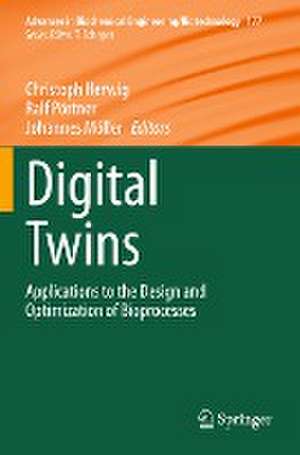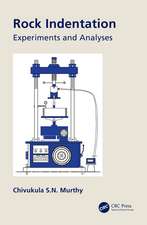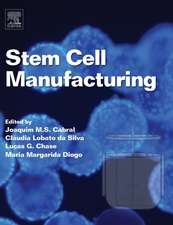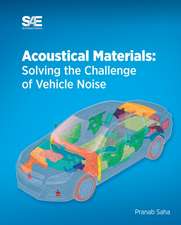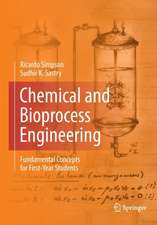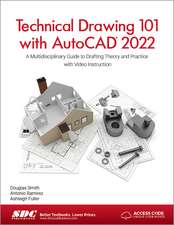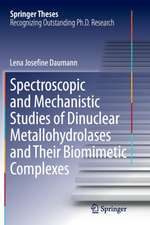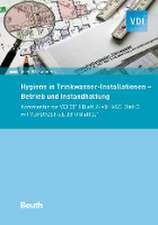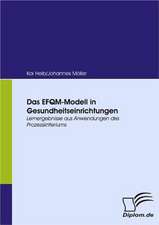Digital Twins: Applications to the Design and Optimization of Bioprocesses: Advances in Biochemical Engineering/Biotechnology, cartea 177
Editat de Christoph Herwig, Ralf Pörtner, Johannes Mölleren Limba Engleză Paperback – 27 apr 2022
Both processes have undergone significant changes over the past few decades, moving from data-driven approaches into the 21st-century digitalization of the bioprocess industry. Moreover, the high demand for biotechnological products calls for efficient methods during research and development, as well as during tech transfer and routine manufacturing.
In this regard, one promising tool is the use of digital twins, which offer a virtual representation of the bioprocess. They reflect the mechanistics of the biological system and the interactions between process parameters, key performance indicators and product quality attributes in the form of a mathematical process model. Furthermore, digital twins allow us to use computer-aided methods to gain an improved process understanding, to test and plan novel bioprocesses, and to efficiently monitor them.
This book focuses on the application of digital twins in various contexts, e.g. computer-aided experimental design, seed train prediction, and lifeline analysis. Covering fundamentals as well as applications, the two volumes offers the ideal introduction to the topic for researchers in academy and industry alike.
| Toate formatele și edițiile | Preț | Express |
|---|---|---|
| Paperback (2) | 1814.24 lei 6-8 săpt. | |
| Springer International Publishing – 27 apr 2022 | 1814.24 lei 6-8 săpt. | |
| Springer International Publishing – 27 apr 2022 | 1814.73 lei 6-8 săpt. | |
| Hardback (2) | 1820.22 lei 6-8 săpt. | |
| Springer International Publishing – 26 apr 2021 | 1820.22 lei 6-8 săpt. | |
| Springer International Publishing – 26 apr 2021 | 1820.70 lei 6-8 săpt. |
Din seria Advances in Biochemical Engineering/Biotechnology
-
 Preț: 385.84 lei
Preț: 385.84 lei -
 Preț: 383.12 lei
Preț: 383.12 lei -
 Preț: 383.71 lei
Preț: 383.71 lei - 18%
 Preț: 1220.45 lei
Preț: 1220.45 lei - 18%
 Preț: 1816.43 lei
Preț: 1816.43 lei - 5%
 Preț: 1415.54 lei
Preț: 1415.54 lei - 5%
 Preț: 2113.74 lei
Preț: 2113.74 lei - 18%
 Preț: 1219.16 lei
Preț: 1219.16 lei - 18%
 Preț: 1823.56 lei
Preț: 1823.56 lei - 18%
 Preț: 1219.63 lei
Preț: 1219.63 lei - 18%
 Preț: 1224.18 lei
Preț: 1224.18 lei - 18%
 Preț: 1826.07 lei
Preț: 1826.07 lei - 18%
 Preț: 1836.31 lei
Preț: 1836.31 lei -
 Preț: 383.71 lei
Preț: 383.71 lei - 18%
 Preț: 1821.81 lei
Preț: 1821.81 lei - 18%
 Preț: 1822.57 lei
Preț: 1822.57 lei - 18%
 Preț: 2477.79 lei
Preț: 2477.79 lei - 18%
 Preț: 1817.08 lei
Preț: 1817.08 lei - 18%
 Preț: 2467.38 lei
Preț: 2467.38 lei - 18%
 Preț: 2085.39 lei
Preț: 2085.39 lei - 18%
 Preț: 2082.40 lei
Preț: 2082.40 lei - 18%
 Preț: 1212.84 lei
Preț: 1212.84 lei - 18%
 Preț: 1213.65 lei
Preț: 1213.65 lei - 18%
 Preț: 1815.49 lei
Preț: 1815.49 lei -
 Preț: 388.72 lei
Preț: 388.72 lei - 18%
 Preț: 1814.73 lei
Preț: 1814.73 lei - 18%
 Preț: 939.46 lei
Preț: 939.46 lei - 18%
 Preț: 1820.22 lei
Preț: 1820.22 lei
Preț: 1814.24 lei
Preț vechi: 2212.49 lei
-18% Nou
Puncte Express: 2721
Preț estimativ în valută:
347.24€ • 361.15$ • 290.99£
347.24€ • 361.15$ • 290.99£
Carte tipărită la comandă
Livrare economică 13-27 martie
Preluare comenzi: 021 569.72.76
Specificații
ISBN-13: 9783030716585
ISBN-10: 3030716589
Ilustrații: VII, 254 p.
Dimensiuni: 155 x 235 mm
Greutate: 0.37 kg
Ediția:1st ed. 2021
Editura: Springer International Publishing
Colecția Springer
Seria Advances in Biochemical Engineering/Biotechnology
Locul publicării:Cham, Switzerland
ISBN-10: 3030716589
Ilustrații: VII, 254 p.
Dimensiuni: 155 x 235 mm
Greutate: 0.37 kg
Ediția:1st ed. 2021
Editura: Springer International Publishing
Colecția Springer
Seria Advances in Biochemical Engineering/Biotechnology
Locul publicării:Cham, Switzerland
Cuprins
Potential of model-based design of experiments approaches for bioprocess scale-down.- Digital Twins and Their Role in Model-Assisted Design of Experiments.- Digital twins for bioprocess control strategy development and realization.- The Kalman filter for the supervision of cultivation processes.-The challenge of implementing digital twins in operating value chains.- Digital twins in the (bio)pharma industry.- Numerical methods for the design and description of in vitro expansion processes of human mesenchymal stem cells.- Euler-Lagrangian Simulations: A Proper Tool for Predicting Cellular Performance in Industrial Scale Bioreactors.
Notă biografică
Christoph Herwig is a Full Professor of Biochemical Engineering at the Vienna University of Technology (Austria), with a background in Bioprocess Engineering from the RWTH Aachen (Germany) and Ph.D. in Bioprocess Identification at the EPFL (Switzerland). Prior to his Ph.D. graduation, he has also worked in industry in the design and commissioning of large chemical facilities. His main research focuses on the development of data science methods for integrated and efficient bioprocess development along PAT and QbD principles for biopharmaceuticals. In 2013 he founded the company Exputec addressing data science solutions for the biopharma life cycle, which was fused in Körber AG in 2020.
Ralf Pörtner studied Chemical Engineering at the University of Dortmund (Germany), and received his Ph.D. at the Department of Mechanical Process Engineering of the same university. After a post-doctoral study at the University of Tsukuba (Japan), he took on the role of Senior Engineer and Head of the working group "Cell Culture and Tissue Engineering" at the Technical University of Hamburg (Germany). Since 2010 he is Honorary Professor at TH Mittelhessen University of Applied Sciences, Giessen (Germany). He is currently one of the coordinators of the research focus "Regeneration, Implants and Medical Technology" of the Technical University of Hamburg (Germany), and member of the directorate of the Research Center Medical Technology (FMTHH). His main research activities include the development of bioreactors, in particular for cell cultures and microbial reactions, as well as model-based control concepts, and tissue engineering.
Johannes Möller studied Bioprocess Engineering at the Hamburg University of Technology (TUHH), Germany, where he did his Ph.D. and worked as a scientist at the Institute of Bioprocess and Biosystems Engineering (Head: Prof. An-Ping Zeng). His research focuses on accelerated and knowledge-driven bioprocess design and optimization using novel statistical and computational methods. The main areas of interest are: Biosystems Engineering, software development for model-assisted bioprocess development and experimental design, and computational methods for bioprocess characterization and control. Since 2020, he joined a pharmaceutical company where he is responsible for the manufacturing of biopharmaceuticals, and he has also worked as an external scientist at TUHH.
Ralf Pörtner studied Chemical Engineering at the University of Dortmund (Germany), and received his Ph.D. at the Department of Mechanical Process Engineering of the same university. After a post-doctoral study at the University of Tsukuba (Japan), he took on the role of Senior Engineer and Head of the working group "Cell Culture and Tissue Engineering" at the Technical University of Hamburg (Germany). Since 2010 he is Honorary Professor at TH Mittelhessen University of Applied Sciences, Giessen (Germany). He is currently one of the coordinators of the research focus "Regeneration, Implants and Medical Technology" of the Technical University of Hamburg (Germany), and member of the directorate of the Research Center Medical Technology (FMTHH). His main research activities include the development of bioreactors, in particular for cell cultures and microbial reactions, as well as model-based control concepts, and tissue engineering.
Johannes Möller studied Bioprocess Engineering at the Hamburg University of Technology (TUHH), Germany, where he did his Ph.D. and worked as a scientist at the Institute of Bioprocess and Biosystems Engineering (Head: Prof. An-Ping Zeng). His research focuses on accelerated and knowledge-driven bioprocess design and optimization using novel statistical and computational methods. The main areas of interest are: Biosystems Engineering, software development for model-assisted bioprocess development and experimental design, and computational methods for bioprocess characterization and control. Since 2020, he joined a pharmaceutical company where he is responsible for the manufacturing of biopharmaceuticals, and he has also worked as an external scientist at TUHH.
Textul de pe ultima copertă
This is the second of two volumes that together provide an overview of the latest advances in the generation and application of digital twins in bioprocess design and optimization.
Both processes have undergone significant changes over the past few decades, moving from data-driven approaches into the 21st-century digitalization of the bioprocess industry. Moreover, the high demand for biotechnological products calls for efficient methods during research and development, as well as during tech transfer and routine manufacturing.
In this regard, one promising tool is the use of digital twins, which offer a virtual representation of the bioprocess. They reflect the mechanistics of the biological system and the interactions between process parameters, key performance indicators and product quality attributes in the form of a mathematical process model. Furthermore, digital twins allow us to use computer-aided methods to gain an improved process understanding, to test and plan novel bioprocesses, and to efficiently monitor them.
This book focuses on the application of digital twins in various contexts, e.g. computer-aided experimental design, seed train prediction, and lifeline analysis. Covering fundamentals as well as applications, the two volumes offers the ideal introduction to the topic for researchers in academy and industry alike.
Both processes have undergone significant changes over the past few decades, moving from data-driven approaches into the 21st-century digitalization of the bioprocess industry. Moreover, the high demand for biotechnological products calls for efficient methods during research and development, as well as during tech transfer and routine manufacturing.
In this regard, one promising tool is the use of digital twins, which offer a virtual representation of the bioprocess. They reflect the mechanistics of the biological system and the interactions between process parameters, key performance indicators and product quality attributes in the form of a mathematical process model. Furthermore, digital twins allow us to use computer-aided methods to gain an improved process understanding, to test and plan novel bioprocesses, and to efficiently monitor them.
This book focuses on the application of digital twins in various contexts, e.g. computer-aided experimental design, seed train prediction, and lifeline analysis. Covering fundamentals as well as applications, the two volumes offers the ideal introduction to the topic for researchers in academy and industry alike.
Caracteristici
First book to provide an overview of the role of digital twins in bioprocessing Shows the application of digital twins in various contexts Explores new and efficient methods for research and development, and smart manufacturing
